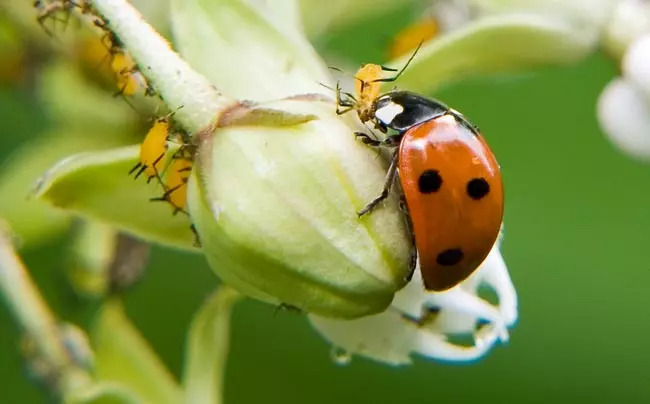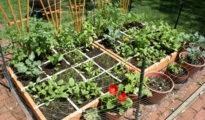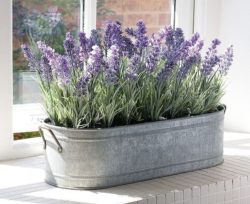When most people hear the word ‘insects' in relation to their garden, they often think of pests that damage crops and flowers. But not all insects are bad news for gardeners. In fact, many of them can be extremely beneficial. Encouraging natural predators in your garden can help control pests, eliminating the need for harmful chemical pesticides. This article explores the role of these beneficial insects, which natural garden predators to invite, and how to make your garden a welcoming place for them.

Why Encourage Natural Predators in the Garden?
1. Chemical-Free Pest Control:
By encouraging natural predators, you're using nature's own pest control system. This reduces the need for chemical insecticides, which can be harmful to the environment and to beneficial insects.
2. Improved Plant Health:
With fewer pests munching on them, your plants will be healthier, leading to better yields in the case of fruit and vegetable gardens.
3. Biodiversity:
Encouraging a variety of insect species can increase the biodiversity of your garden, which can be beneficial for the overall health of your ecosystem.
Top Beneficial Insects and Their Prey
1. Ladybugs:
Prey: Aphids, mites, and other small insects.
Attracting them: Plant dill, fennel, and yarrow. Avoid using pesticides that can harm ladybugs.
2. Lacewings:
Prey: Aphids, caterpillars, mealybugs, and others.
Attracting them: Plant dill, angelica, and goldenrod.
3. Parasitic Wasps:
Prey: Caterpillars, aphids, and beetle larvae.
Attracting them: Grow plants with small flowers like sweet alyssum, dill, and parsley.
4. Praying Mantis:
Prey: Various insects, including beetles, crickets, and grasshoppers.
Attracting them: Plant tall grasses and shrubs where they can hide and lay their egg cases.
5. Spiders:
Prey: Various insects, including aphids and caterpillars.
Attracting them: Allow areas of your garden to grow a little wild to provide hiding places.
Tips for Encouraging Beneficial Insects
1. Avoid Broad-Spectrum Pesticides:
These kill all insects, including the beneficial ones. If you must use a pesticide, opt for one targeted specifically to the pest you're trying to control.
2. Plant a Diversity of Plants:
Different insects are attracted to different plants. By planting a diverse range of plants, you increase the chances of attracting a variety of beneficial insects.
3. Provide Shelter:
Many beneficial insects need places to overwinter or lay their eggs. Leaving some areas of your garden a little wild, with leaf litter or fallen logs, can provide this shelter.
4. Provide a Water Source:
A shallow dish filled with pebbles and water can serve as a drinking spot for many insects.
5. Avoid Neatness:
While it's tempting to have a perfectly manicured garden, a little bit of wildness can be beneficial. Let some plants flower and go to seed, leave some leaf litter around, and embrace the occasional fallen log or rock pile.
Nature has its own checks and balances. By embracing and encouraging beneficial insects in our gardens, we tap into a natural and sustainable form of pest control. Not only does this lead to healthier plants and reduced reliance on chemicals, but it also fosters a thriving, vibrant ecosystem right in our own backyards. So next time you spot a ladybug or lacewing, give them a silent thank you for the hard work they're doing.
Understanding the Food Web
It's essential to recognize that gardens are not just about plants. They're micro-ecosystems. Insects, both beneficial and pests, play crucial roles within this system. For instance, while ladybugs are hunters, they are also prey for birds. This dynamic helps maintain the equilibrium in our gardens. The more diverse the garden's ecosystem, the more balanced and resilient it is against external threats like disease or pest infestations.
Additional Beneficial Insects
1. Ground Beetles:
Prey: Slugs, caterpillars, and other soft-bodied pests.
Attracting them: Ground beetles are nocturnal, so they need undisturbed places to hide during the day. Leave some areas of your garden untouched, like leaf piles or stone paths.
2. Tachinid Flies:
Prey: Caterpillars, beetles, and sawflies.
Attracting them: These flies are attracted to nectar-rich flowers. Planting herbs like dill, parsley, or flowers like Queen Anne's lace can help.
3. Hoverflies:
Prey: Aphids primarily.
Attracting them: They're attracted to flowers with open petals like asters or marigolds. Plus, they're excellent pollinators!
Plants That Attract Beneficial Insects
Certain plants are magnets for beneficial insects, either providing them with nectar, pollen, or serving as host plants for their larvae.
- Nectar Plants: Flowers like calendula, cosmos, and zinnia are rich in nectar, attracting a variety of beneficial insects.
- Herbs: Allowing herbs to flower, like basil, mint, or cilantro, can draw beneficial insects.
- Native Plants: Native plants are adapted to your local ecosystem, and many beneficial insects have co-evolved with them. Research native plants for your region and include them in your garden.
The Role of Pollinators
While our focus has primarily been on predatory beneficial insects, we can't forget about pollinators like bees and butterflies. Though they may not hunt pests, they play an invaluable role in plant reproduction. Without pollinators, we wouldn't have fruits or vegetables!
Fostering a Year-Round Habitat
While we often focus on the active growing season, remember that insects need habitat year-round:
- Winter: Many beneficial insects overwinter in gardens. By leaving plant stalks, leaf piles, or even not mulching until late spring, you give them a chance to emerge when the weather warms.
- Spring: This is when many insects lay eggs. Ensure that there are plenty of host plants and undisturbed spots for them.
- Summer: Ensure there's a steady supply of blooming plants for nectar and pollen.
- Autumn: As plants die back, resist the urge to do a complete garden clean-up. Many insects will start looking for overwintering spots.
By expanding our understanding of beneficial insects and their intricate relationships with our gardens, we can better appreciate the interconnectedness of nature. A garden is not just a place of beauty but a thriving ecosystem. Embracing this complexity and working with nature—rather than against it—can lead to healthier, more resilient gardens and a deeper appreciation for the little creatures that call it home.



















